|
|
|
Sort Order |
|
|
|
Items / Page
|
|
|
|
|
|
|
| Srl | Item |
| 1 |
ID:
128071
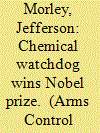

|
|
|
|
|
| Publication |
2013.
|
| Summary/Abstract |
The Organisation for the Prohibition of Chemical Weapons (OPCW) was awarded the Nobel Peace Prize on Oct. 11 for its efforts in eliminating the scourge of chemical warfare.
The honor boosted the Hague-based organization just 10 days after its personnel arrived in Syria on the most challenging mission of its 16-year history: dismantling the chemical arsenal of President Bashar al-Assad's besieged government.
In an Oct. 11 statement to the press, OPCW Director-General Ahmet Üzümcü, a former Turkish diplomat, said the OPCW operates "away from the glare of international publicity" while taking on the "onerous but noble task" of implementing the Chemical Weapons Convention, which took effect in 1997.
|
|
|
|
|
|
|
|
|
|
|
|
|
|
|
|
| 2 |
ID:
128080
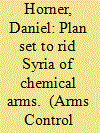

|
|
|
|
|
| Publication |
2013.
|
| Summary/Abstract |
The UN Security Council on Sept. 27 unanimously adopted a plan for destroying Syria's chemical arsenal, endorsing a blueprint that the Executive Council of the Organisation for the Prohibition of Chemical Weapons (OPCW) had approved a few hours earlier. The actions by the 41-member Executive Council, which generally operates by consensus, and the 15-member Security Council establish timelines for the destruction of Syria's chemical weapons. The two councils were building on a framework agreement for control and elimination of Syria's arsenal concluded by Russian Foreign Minister Sergey Lavrov and U.S. Secretary of State John Kerry on Sept. 14 after days of intensive bilateral negotiations in Geneva. The two council decisions spell out ways in which the United Nations and the OPCW are to coordinate in overseeing Syria's chemical disarmament. The documents approved by the two councils cite Article VIII of the Chemical Weapons Convention (CWC), which says that the Executive Council should refer compliance issues "of particular gravity and urgency" to the Security Council. The OPCW is the international body that implements the CWC.
|
|
|
|
|
|
|
|
|
|
|
|
|
|
|
|
| 3 |
ID:
132783
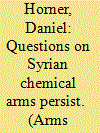

|
|
|
|
|
| Publication |
2014.
|
| Summary/Abstract |
Efforts to resolve several issues arising from Syria's chemical weapons program appear to be moving slowly, even as the destruction of Syrian chemical weapons material aboard a U.S. ship in the Mediterranean Sea began this month.
Officials from the Organisation for the Prohibition of Chemical Weapons (OPCW) and some of its key member states have highlighted the need for Syria to destroy its chemical weapons production facilities and resolve questions about its declaration of its arsenal last year.
For months, Robert Mikulak, the U.S. ambassador to the OPCW, has been castigating Syria for its failure to destroy its 12 remaining former chemical weapons production facilities. Destruction of such facilities is a required step under the Chemical Weapons Convention (CWC), which Syria joined last fall. Under a timetable for chemical weapons destruction approved by the OPCW Executive Council last November, that task was to be completed by March 15.
|
|
|
|
|
|
|
|
|
|
|
|
|
|
|
|
| 4 |
ID:
131609


|
|
|
|
|
| Publication |
2014.
|
| Summary/Abstract |
The effort to destroy Syria's chemical weapons program made little visible progress in May as none of the chemical weapons materials remaining in Syria were shipped out of the country for destruction.
Also last month, a team from the Organisation for the Prohibition of Chemical Weapons (OPCW) investigating allegations of chlorine attacks in Syria had to turn back from the site it was investigating and return to Damascus after it came under assault.
Under a schedule set last November by the OPCW Executive Council, the highest-priority chemicals among Syria's declared stockpile of 1,300 metric tons were to be shipped out of the country by Dec. 31 for destruction elsewhere. Most lower-priority materials were to be out by Feb. 5, and Syria was to destroy the rest of the material domestically
|
|
|
|
|
|
|
|
|
|
|
|
|
|
|
|
| 5 |
ID:
128062
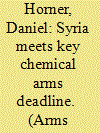

|
|
|
|
|
| Publication |
2013.
|
| Summary/Abstract |
Syria last month met one of the major deadlines for destroying its chemical arms program by "rendering…inoperable" its facilities for producing chemical weapons and for readying the weapons for use, the Organisation for the Prohibition of Chemical Weapons (OPCW) said Oct. 31. Under a plan issued by the OPCW Executive Council and endorsed by the UN Security Council in late September, Syria was to complete "the destruction of chemical weapons production and mixing/filling equipment" by Nov. 1. Mixing and filling equipment is used to load chemical agents into munitions. Government officials and independent experts welcomed the news, but added notes of caution. U.S. Secretary of State John Kerry praised the OPCW-UN team that is overseeing and verifying the Syrian chemical disarmament effort for "work[ing] with unprecedented speed to accomplish the first milestone in eliminating Syria's chemical weapons and reducing the possibility that they will ever be used again." He emphasized that Syria must continue to comply with its obligations under the OPCW Executive Council and UN Security Council decisions.
|
|
|
|
|
|
|
|
|
|
|
|
|
|
|
|
| 6 |
ID:
130372
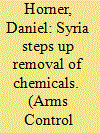

|
|
|
|
|
| Publication |
2014.
|
| Summary/Abstract |
Syria has picked up the pace in removing its chemical weapons materials for overseas destruction and has sent about half of its stockpile out of the country, according to figures in a March 20 press release from the Organisation for the Prohibition of Chemical Weapons (OPCW). Syria had been under broad international pressure to speed up the effort. By the end of February, it had made four shipments, removing about 5 percent of its so-called Priority 1 chemicals and about 20 percent of the Priority 2 chemicals. Citing those figures, Robert Mikulak, the U.S. ambassador to the OPCW, had accused Syria of "continu[ing] to drag its feet." (See ACT, March 2014.) Under a schedule set last November by the OPCW Executive Council, the Priority 1 materials were supposed to leave the country by Dec. 31. All other materials that are part of the overseas destruction program were to leave by Feb. 5. The rest of the approximately 1,300 metric tons of chemical agents that Syria declared is to be destroyed within the country. The removal dates were set with an eye to a June 30 deadline for destruction of the chemical agents, which was established last September by the Executive Council and the UN Security Council. (See ACT, October 2013.)
|
|
|
|
|
|
|
|
|
|
|
|
|
|
|
|
| 7 |
ID:
129110
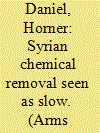

|
|
|
|
|
| Publication |
2014.
|
| Summary/Abstract |
Amid increasing frustration over the pace of Syria's removal of chemical weapons materials for overseas destruction, Syrian authorities are in talks with key countries and experts from the Organisation for the Prohibition of Chemical Weapons (OPCW) and the United Nations on a revised timetable for the removal effort, according to media reports and spokesmen for some of the parties in the negotiations. Syria has proposed a timetable that would take until about the end of May, but the U.S. government "believes that the Syrians are more than capable of moving these chemicals to Latakia on a shorter timetable," a State Department spokesman said in a Feb. 28 e-mail to Arms Control Today. Latakia is the port city in northwestern Syria where the Syrian government is collecting the chemicals from across the country before sending them overseas for destruction.
|
|
|
|
|
|
|
|
|
|
|
|
|
|
|
|
| 8 |
ID:
127861


|
|
|
|
|
| Publication |
2013.
|
| Summary/Abstract |
The United States will destroy Syria's most dangerous chemical weapons, using a mobile technology on board a ship, officials from the international team that is overseeing Syrian chemical disarmament said late last month. In a Nov. 30 press release, the Organisation for the Prohibition of Chemical Weapons (OPCW) said the operations would be conducted "on a U.S. vessel at sea using hydrolysis," a process that breaks down the chemical agent with hot water and a caustic compound such as sodium hydroxide. Hydrolysis is a type of neutralization, which, along with incineration, is one of the two main methods of destroying chemical weapons.
|
|
|
|
|
|
|
|
|
|
|
|
|
|
|
|
|
|
|
|
|